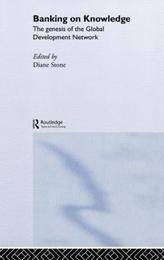
|
Banking on Knowledge: The Genesis of the Global Development Network
Hardback
Main Details
| Title |
Banking on Knowledge: The Genesis of the Global Development Network
|
| Authors and Contributors |
Edited by Diane Stone
|
| Series | Routledge/Warwick Studies in Globalisation |
|---|
| Physical Properties |
| Format:Hardback | | Pages:288 | | Dimensions(mm): Height 234,Width 156 |
|
| Category/Genre | Banking |
|---|
| ISBN/Barcode |
9780415248471
|
| Classifications | Dewey:332.1532 |
|---|
| Audience | | Undergraduate | | Postgraduate, Research & Scholarly | |
|---|
| Illustrations |
5 black & white tables
|
|
Publishing Details |
| Publisher |
Taylor & Francis Ltd
|
| Imprint |
Routledge
|
| Publication Date |
30 November 2000 |
| Publication Country |
United Kingdom
|
Description
Banking on Knowledge is one of the first studies of how the World Bank is reinventing itself as the 'Knowledge Bank'. The book addresses how international organizations and governments are developing partnerships with think tanks, research institutes and other knowledge institutions in the hope of informing and improving policies for reform and development around the world. The book focuses on the recently established Global Development Network (GDN). The GDN is a new and ambitious initiative, sponsored by the World Bank, which is possibly the largest worldwide non-governmental enterprise aimed at producing knowledge as a public good on a global scale. The contributions to Banking on Knowledge are from an internationally acclaimed group of experts, including an original and groundbreaking piece by Joseph Stiglitz, former Chief Economist and Vice President of the World Bank. Subjects covered include: * the changing policy emphasis within the World Bank as it develops alliances with non-governmental actors and promotes civil society * first-hand accounts of the making of this new global network amidst the plethora of existing political, commercial and non-governmental networks * detailed case studies of the problems faced by think tanks and other knowledge institutions across the world * whether knowledge, information and data is used by experts successfully to influence policy. Since the papers in this volume were first presented, the GDN has continued to develop as a new type of global institution that knits together policy institutes around the world, helping them to generate, share and apply new knowledge about pressing development issues. Timely, original and provocative, this book is essential reading for students, researchers, policy makers and professionals with an interest in the future of the World Bank, the strategies of think tanks and the changing nature of development. Simon James; Erik Johnson; Kao Kim Hourn; Knut knustad; Ivan Krastev; Stella Ladi; Evert Lindquist; Oleg Manaev; Helen Nesadurai; Gabriel Ortiz de Zevallos; Alejandro Salas; Diery Seck; Ole Sending; J
|